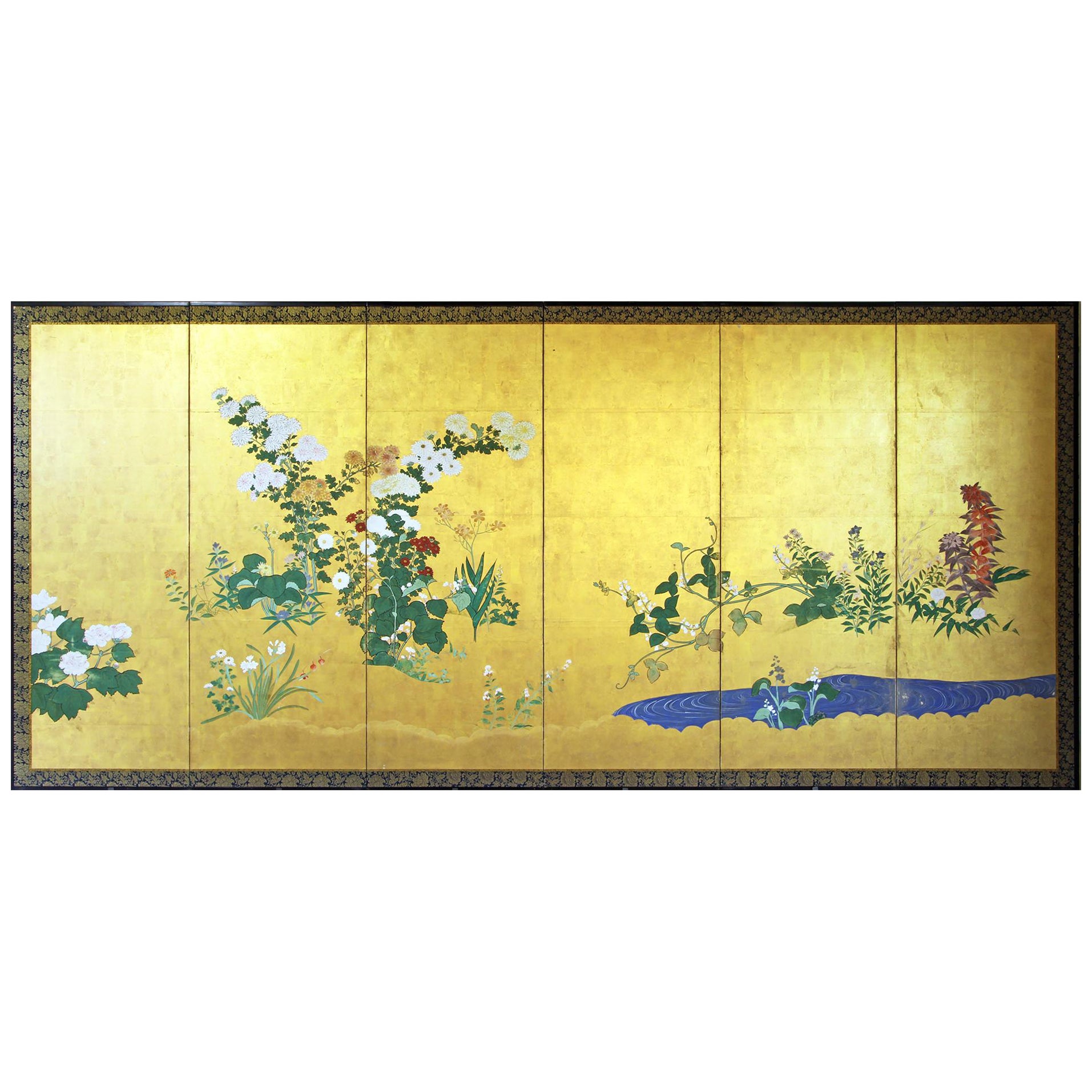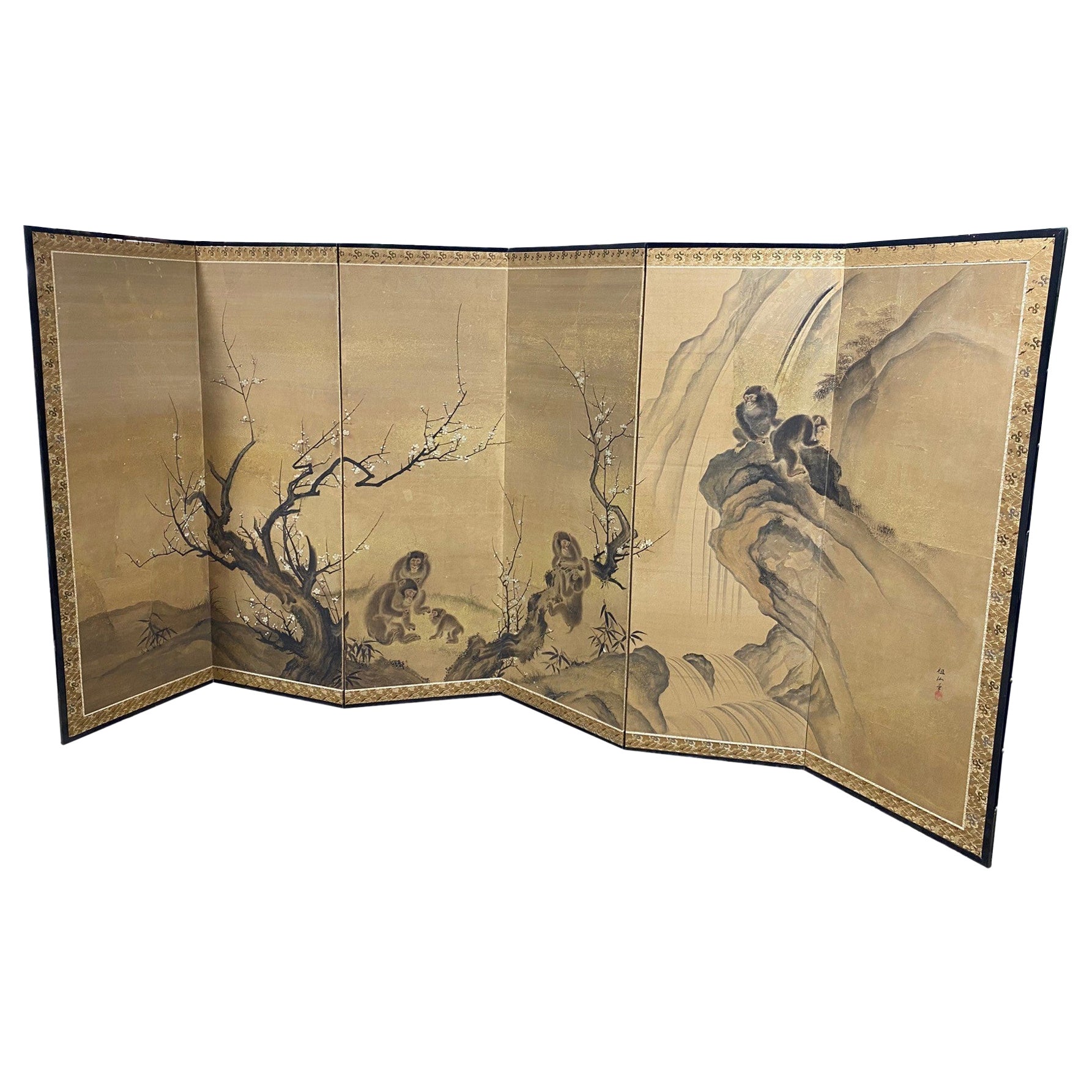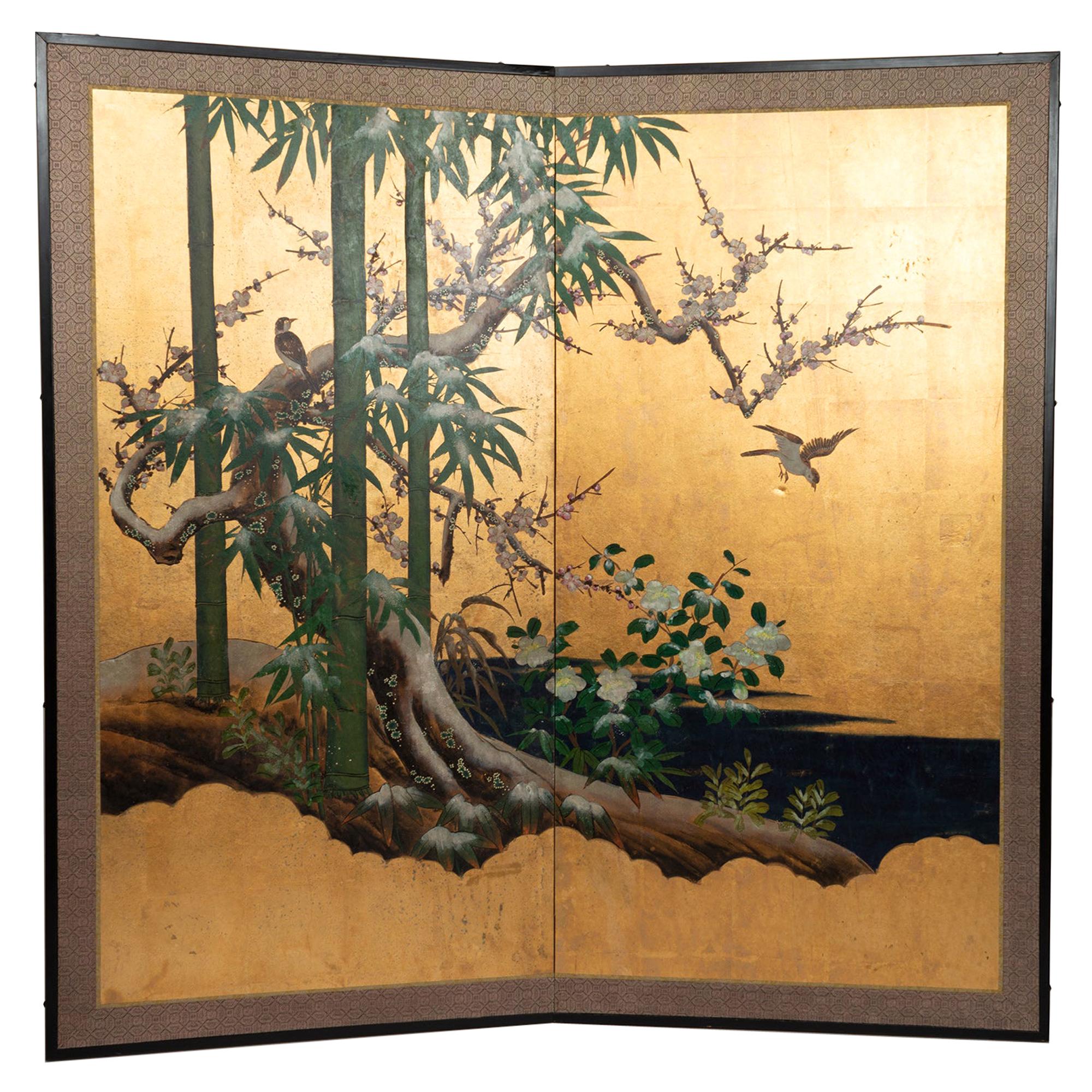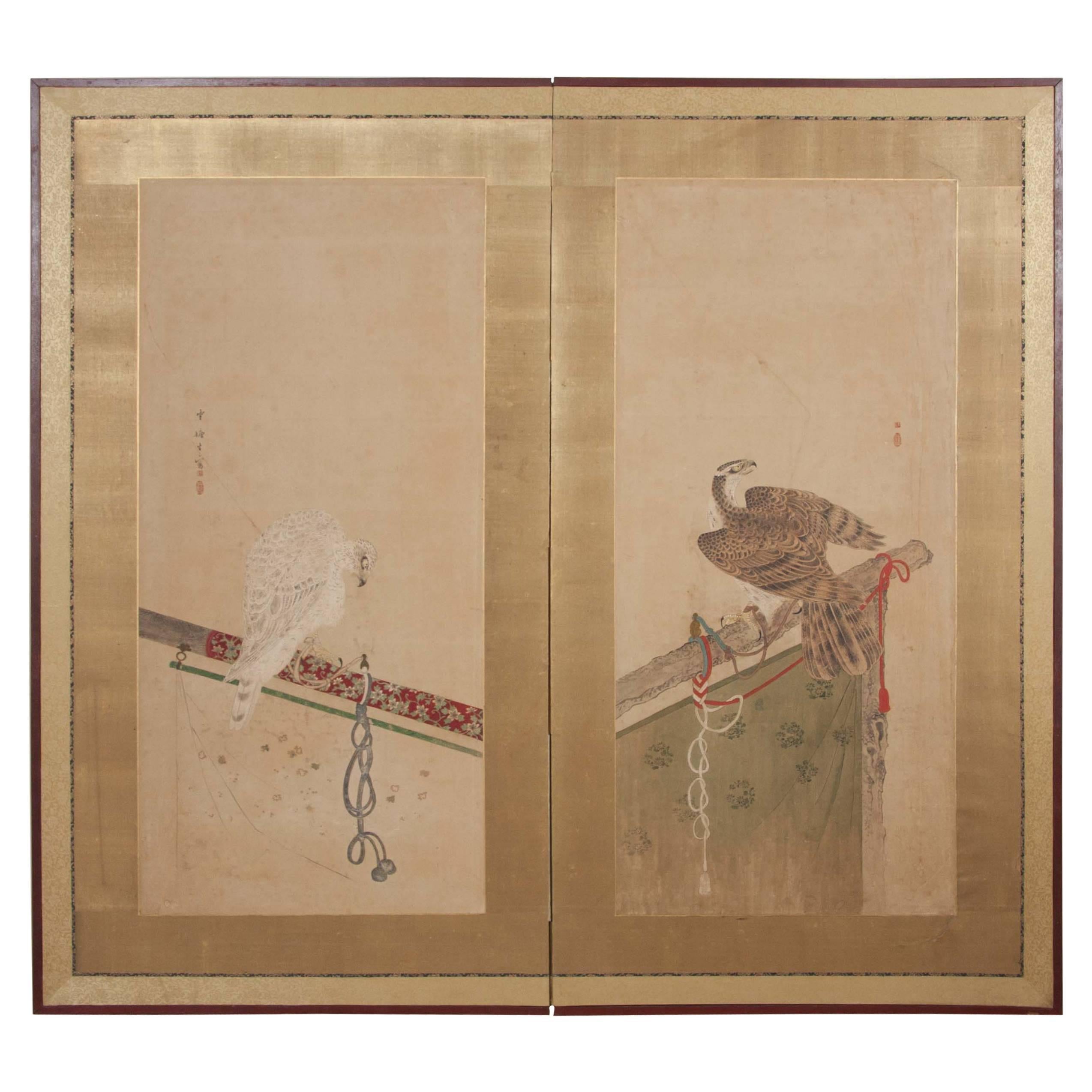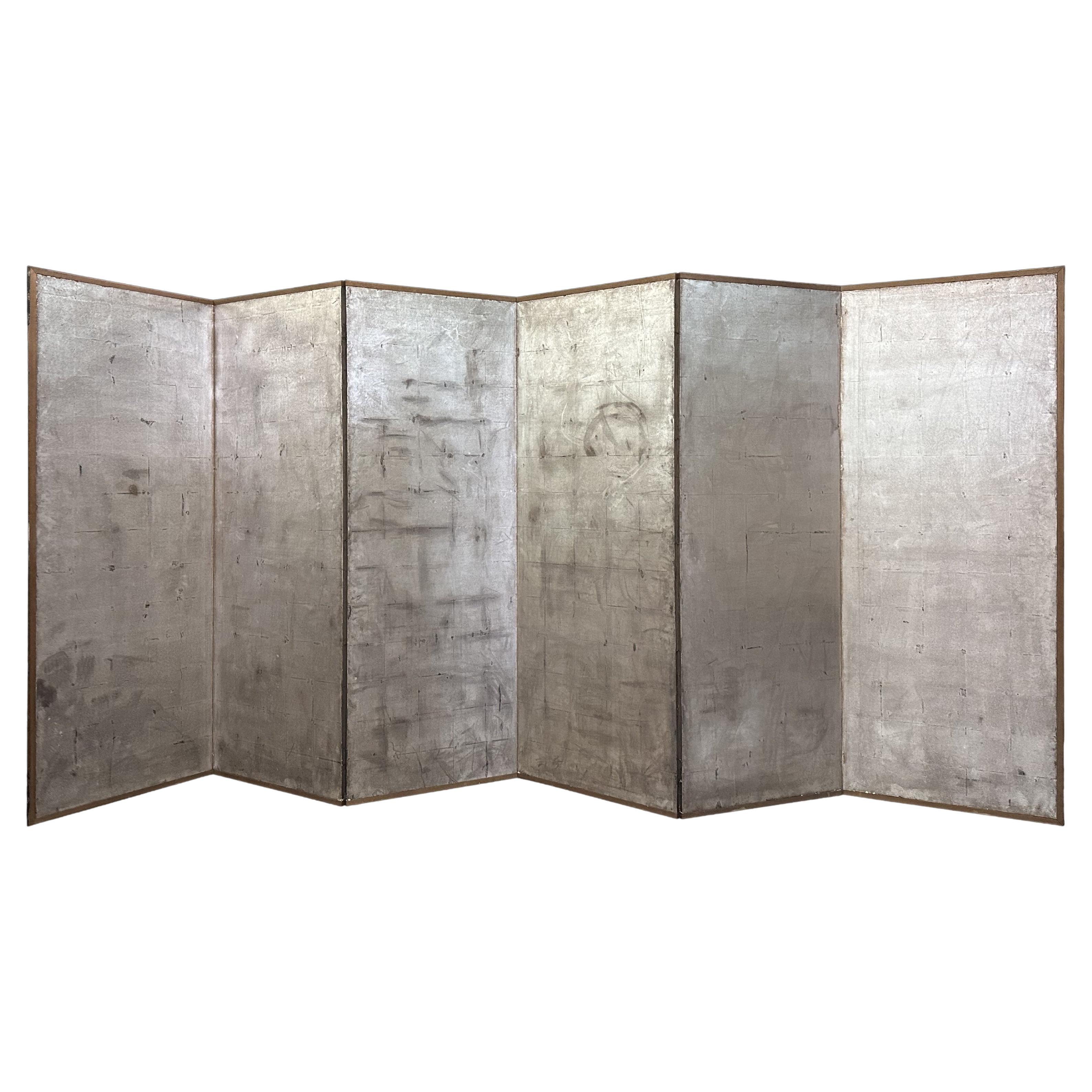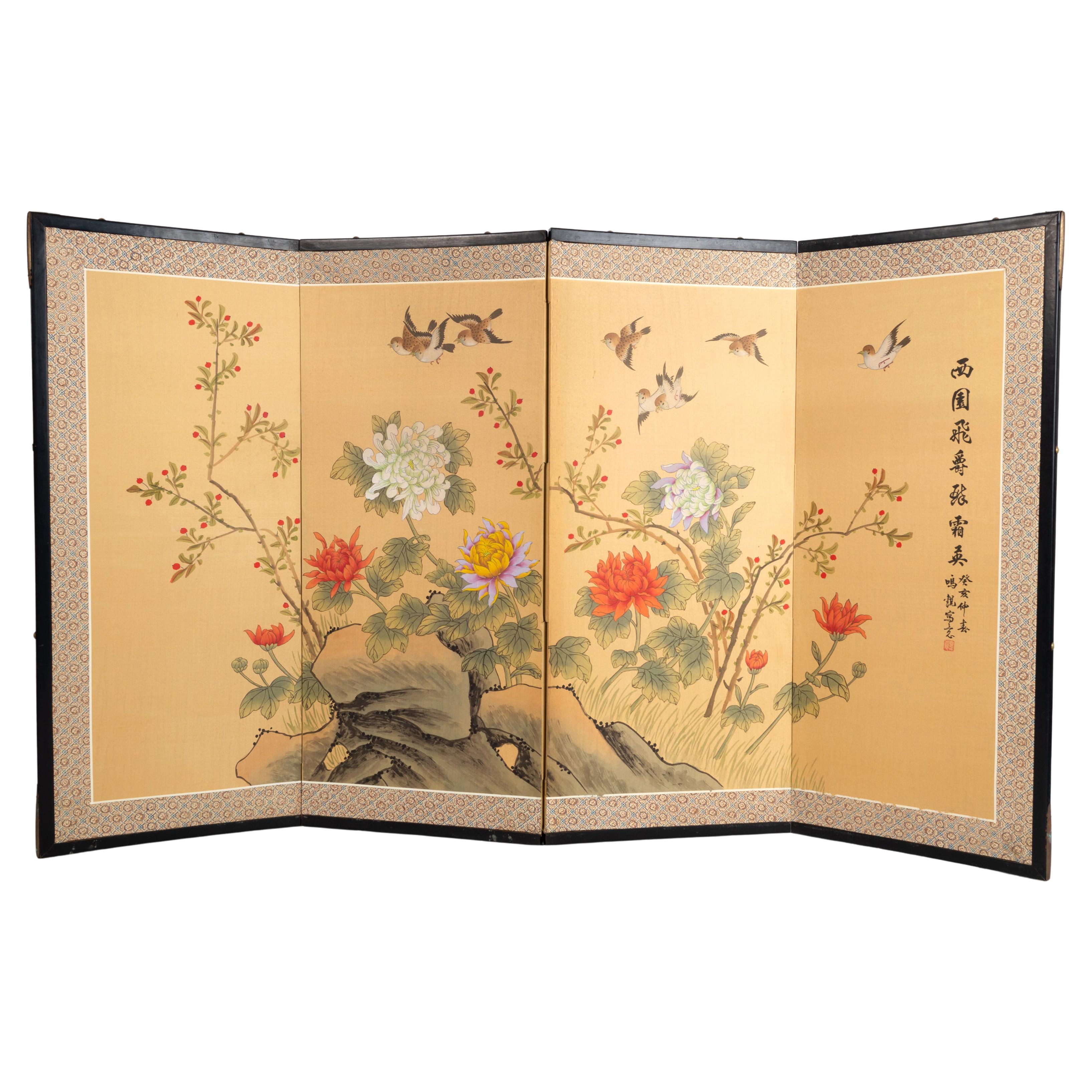Items Similar to Japanese Folding Screen "Byobu" from the Edo Period
Want more images or videos?
Request additional images or videos from the seller
1 of 7
Japanese Folding Screen "Byobu" from the Edo Period
About the Item
Japanese Screen "Byobu", from the Edo period (circa 1800), with two leaves in silk paper mounted on canvas with leather background.
Beautiful floral decoration "Rimpa" with wading birds and water lilies.
Slight accidents.
The screen was used during the Edo Period in the palaces of Japanese aristocrats.
The Byobu had two functions: to partition an open space and to block evil spirits.
The Japanese floral decoration of the Edo Period (1603-1868) directly inspired the European movement which would create Art Nouveau based on the 3 Fs: Fauna, Flora, Feminine.
- Dimensions:Height: 73.23 in (186 cm)Width: 68.12 in (173 cm)Depth: 1.97 in (5 cm)
- Style:Edo (Of the Period)
- Materials and Techniques:
- Place of Origin:
- Period:
- Date of Manufacture:Circa 1800
- Condition:Wear consistent with age and use.
- Seller Location:Paris, FR
- Reference Number:
About the Seller
New to 1stDibs
Joined in the past six months.
No Reviews Yet
Vetted Seller
These experienced sellers undergo a comprehensive evaluation by our team of in-house experts.
1stDibs seller since 2024
Typical response time: 1 hour
- ShippingRetrieving quote...Ships From: Paris, France
- Return PolicyA return for this item may be initiated within 14 days of delivery.
More From This SellerView All
- Samurai Helmet "Zunari Kabuto" - Early Edo (circa 1610)Located in Paris, FRSamurai Helmet "Zunari kabuto" with 3 black lacquered iron plates. Japan, early EDO period, circa 1610. Neck protector (shikoro), 5-strip hineno, laced brown, beige and green. Centra...Category
Antique Early 17th Century Japanese Edo Antiquities
MaterialsIron
- Four Art Deco stools from 1921, mahogany veneered wood trimmed with leather.Located in Paris, FRFour Art Deco stools, mahogany veneered wood trimmed with leather. Small accidents. 49x43x39.5 cm. French work 1921. These stools fit perfectly into the Art Deco style with pure, st...Category
Vintage 1920s French Art Deco Stools
MaterialsMahogany
- Malick Sidibé - The Sarakolé Family - Signed printBy Malick SidibeLocated in Paris, FRMalick Sidibé, "The Sarakolé Family", shot in 1969, printed and signed in 2006. Silver print, baryta paper. Framed. Malick Sidibé (1936-2016) is today considered one of the greatest...Category
Early 2000s Malian Photography
MaterialsPaper
- Alexander Calder - Three Onions - Signed Artist's proof on vellum, 1965.By Alexander CalderLocated in Paris, FRAlexander Calder - "Three Onions" Artist's proof on vellum, 1965, signed lower right. Original frame. H: 51 x W 71 cm. The American artist Alexander Calder was very attached to Fran...Category
Vintage 1960s French Modern Prints
MaterialsPaper
- Albrecht Dürer - Saint EustaceBy Albrecht DürerLocated in Paris, FRAlbrecht Dürer, Saint Eustace. Wood engraving, 1501. Signed with the monogram A.D (Albrecht Dürer) Why not having on a wall a Masterpiece which is also a part of History? Marie-Anto...Category
Antique 16th Century German Renaissance Prints
MaterialsPaper
- Kholuka Yaka Mask, DR CongoLocated in Paris, FRKholuka Yaka Mask, DR Congo. Wood, basketry, textile, raffia. Typical African mask of the Yaka in the south of the Democratic Republic of Congo. The Kholuka Yaka Mask was used in th...Category
Early 20th Century Congolese Tribal Tribal Art
MaterialsTextile, Raffia, Wood
You May Also Like
- Edo Landscape Japanese Folding ScreenBy Japanese StudioLocated in Brescia, ITRefined work by a painter from the first half of the 19th century, from the landscape of the "Rinpa" school by a painter from the end of the 18th century, the Rinpa school. Six panels painted in ink on gold leaf and "gofun" on vegetable paper. The flowers are made with the "gofun" technique, natural or pigmented white oyster powder. Rinpa is one of the major historical schools of Japanese painting. The style was consolidated by the brothers Ogata Korin (1658–1716) and Ogata Kenzan (1663–1743). This folding screen has a very clean design that leaves plenty of room for the beautiful golden landscape. It comes flat and you can easily hang it with our hooks. Lucio Morini...Category
Antique 18th Century Japanese Edo Paintings and Screens
MaterialsGold Leaf
- Japanese Asian Large Edo Six-Panel Folding Byobu Screen Landscape Monkeys TreesLocated in Studio City, CAAn absolutely gorgeous, wonderfully composed six-panel Japanese byobu folding screen / room divider depicting a family of playful monkeys among the blooming trees and mountainous lan...Category
Antique Early 19th Century Japanese Edo Paintings and Screens
MaterialsGold Leaf
- Antique 19th Century Japanese Two-Panel Screen ‘Byobu’, Kano School, Edo PeriodLocated in London, GBJapanese Kano School Edo period two-panel screen depicting flowering prunus and bamboo on a rock formation, with colorful birds next to a body of water. ...Category
Antique Mid-19th Century Japanese Edo Paintings and Screens
MaterialsGold Leaf
- Japanese Edo Period Two-Panel ScreenLocated in Stamford, CTA Japanese Edo Period two panel folding screen with white and brown hawks of ink and color on paper.Category
Antique Mid-19th Century Japanese Edo Paintings and Screens
MaterialsPaper
- Edo Period Japanese Oxidized Silver Leafed Folded ScreenLocated in Fukuoka, JPThis naturally oxidized silver-leafed folded screen is a stunning and unique work of art. The screen was originally evenly colored, but it oxidized over time due to exposure to the e...Category
Antique 19th Century Japanese Paintings and Screens
MaterialsSilver Leaf
- Japanese Four-Panel Folding Screen Byobu Signed Showa Period C.1950Located in London, GBA four-panel Japanese Byobu folding screen depicting a floral scene with birds. Japan, C.1950 Showa Period An attractive example, beautifully h...Category
Mid-20th Century Japanese Showa Paintings and Screens
MaterialsSilk, Paper
Recently Viewed
View AllMore Ways To Browse
Hand Painted Japanese Gold Screen
Shunga Period
Asian Bamboo Single Screen Panel
19th Century Japanese Poem Calligraphy Hanging Scroll
Korean Fish Painting On Silk
Japanese Hand Painted Art
Thangka White
Kitchen Unit Metal
1970s Burl Wood Table
Charles Ray Eames Desk
Cut Edge Mirror
Vintage Scandinavian Wall Light
Antique Carved Upholstered French Chairs
Chinese Antique Wall Decor
Danish Lassen Lounge Chair
Three Murano Flush
Antique French Commode Feet
Hanging Wall Mirror Art
